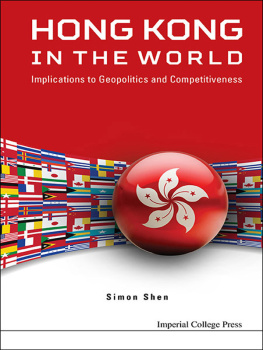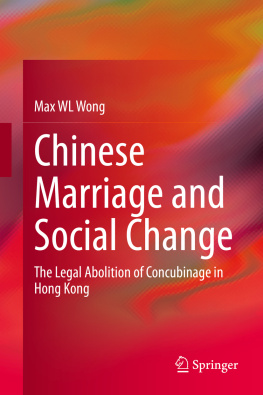THE POLITICAL ECONOMY OF HEALTH CARE DEVELOPMENT AND REFORMS IN HONG KONG
To Naureen
The Political Economy of Health Care Development and Reforms
in Hong Kong
VICTOR C.W. WONG
Department of Social Work
Hong Kong Baptist University
First published 1999 by Ashgate Publishing
Reissued 2018 by Routledge
2 Park Square, Milton Park, Abingdon, Oxon, OX14 4RN
52 Vanderbilt Avenue, New York, NY 10017
Routledge is an imprint of the Taylor & Francis Group, an informa business
Copyright Victor C. W. Wong 1999
All rights reserved. No part of this book may be reprinted or reproduced or utilised in any form or by any electronic, mechanical, or other means, now known or hereafter invented, including photocopying and recording, or in any information storage or retrieval system, without permission in writing from the publishers.
Notice:
Product or corporate names may be trademarks or registered trademarks, and are used only for identification and explanation without intent to infringe.
Publishers Note
The publisher has gone to great lengths to ensure the quality of this reprint but points out that some imperfections in the original copies may be apparent.
Disclaimer
The publisher has made every effort to trace copyright holders and welcomes correspondence from those they have been unable to contact.
A Library of Congress record exists under LC control number: 98074643
ISBN 13: 978-1-138-33768-8 (hbk)
ISBN 13: 978-0-429-44220-9 (ebk)
Contents
This book has originated from my doctoral thesis submitted to the University of Sheffield. Among many individuals who have offered invaluable help and support throughout the process of completing this book, my first and foremost gratitude goes to Professor Alan Walker. He supervised this study as my research supervisor and provided a wealth of ideas on the subjects I pursued in this book. His comments are sharp, stimulating and insightful. I am indeed very much indebted to his kindness to write for me the foreword of this book.
I would like to express my sincere thanks to David Phillips. In addition to valuable suggestions and comments on this work, he has strengthened my grasp of research issues raised in social sciences. I thank him for his valuable suggestions and support.
Thanks are due to all the persons I interviewed for their opinion on the different aspects of health care reforms in Hong Kong.
My whole-hearted thanks and gratitude must go to Sammy Chiu who encouraged me to embark on a doctoral study, and who has been my comrade in the movement for social reforms in Hong Kong since the mid-1980s.
I owe a special and lasting gratitude to my companion Naureen whose love and support enabled me to go through the whole process of the study and the preparation of this book.
Thanks are also due to May Chan for her invaluable help in word processing.
I have to acknowledge that in spite of the efforts of all the above people, all mistakes or deficiencies of this book remain my responsibility alone.
This book is a unique account of the development and reform of health care in Hong Kong. From its origins under British colonial rule to the latest debates about the impact of demographic change, rising public expectations and advances in medical science and technology Hong Kongs health care policy and institutions are subjected to sustained critical scrutiny. It is the most comprehensive analysis available of health care policy in Hong Kong and is bound to become a standard reference work for a wide range of scholars interested in Hong Kong, China, health policy, the sociology of health care and comparative social policy.
The main focus of the book is on policy developments since 1945 and Wong shows how successive governments developed health policy in both a capitalist and Chinese context, with an emphasis initially on charity hospitals and family responsibility and, following riots in 1966/67, the growth of public provision for those who could not afford private medical care but with a strong emphasis on rationing. Thus, rather than adopting a fully public health care system Hong Kong instituted a two-tier one. The limits to the expansion and improvement of public medicine were set by the priority given by government to economic development and the maintenance of a low tax policy. The latest chapter in health financing sees the government seeking to promote private health insurance, as part of a general policy of privatisation of Hong Kongs social services, with all the predictable consequences for the exclusion of the poor and high-risk groups and increasing health inequalities.
The importance of this book lies not only in the detailed record it provides of the development of health policy and institutions in Hong Kong, it is also a major work of political economy. Wong utilises the political economy perspective to demonstrate how the state interacts with the dominant interests of capital, the public demand for health care and the power of the medical profession in the formation of health policy. The book emphasises the role of the medical profession and critically examines the nature of medical power and how it has helped to shape health care development and reform. A further important and novel contribution of this book is the consideration it gives to the role of the family and Chinese medicine alongside that of formal medicine. Wong shows how policy makers view the family as a crucial element in cost containment in minimising the hospitalisation of frail and chronically sick patients. The discourses surrounding the introduction of support for family carers focus on the family as a free resource. Similarly, the use of Chinese medicine is strongly reliant on family (female) care. Both traditional Chinese medicine and family care are viewed as having a major role in tackling the escalating costs of health care resulting from high-tech western medicine and demographic change.
Victor Wong is to be congratulated for producing such an informative, engaging and accessible work of scholarship. It is a major contribution to the literature on health policy and a unique account of developments in this field in Hong Kong. It is with great pleasure and pride that I endorse it.
Alan Walker
University of Sheffield
Health care policy is certainly one of the most significant components of public policies in developed countries. On average, annual expenditure on health care accounted for 8.1 per cent of Gross Domestic Product (GDP) in twenty-four OECD countries in 1992, and public health spending as a percent of GDP reached 5.9 per cent (OECD, 1996). In Hong Kong, the public and private sectors together spent 4.7 per cent of the GDP on health care in 1995. Of this, 2.1 per cent was public spending and 2.6 per cent was private spending (Wong, 1999). However, the government of Hong Kong believes that Hong Kongs annual expenditure on health care would be about 6 per cent of the GDP if public spending on infrastructural and supporting services were included (Hong Kong Government, 1993a). One of the biggest single cost items in the public health care system is the rental value of land used for health care facilities, which is almost treated as free (Hay, 1992). If this was taken into consideration, it would no doubt increase the proportion of public health spending. Merely from the sheer size of health care spending, the importance of health care policy can be realised.











